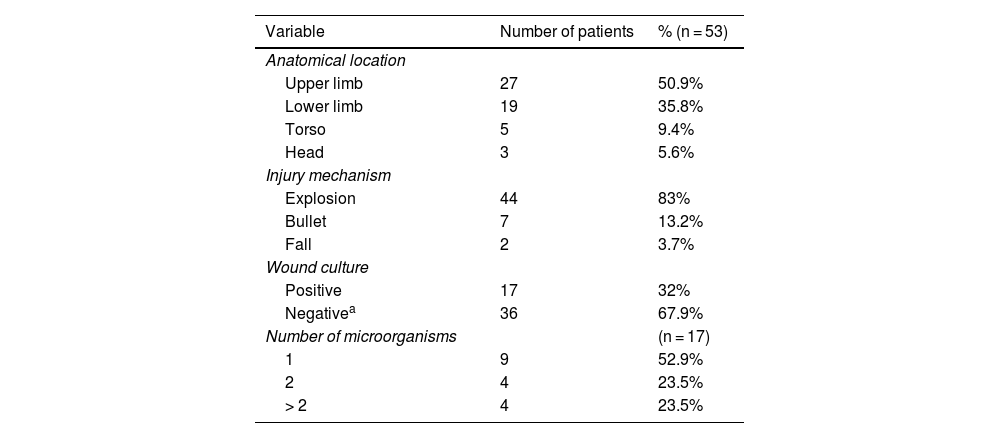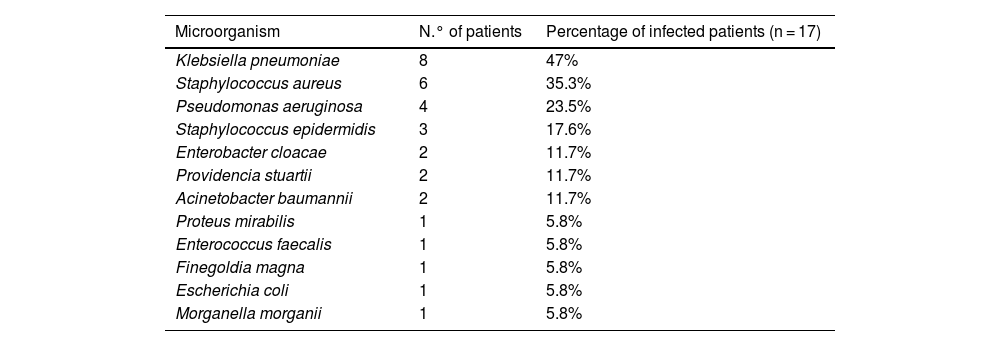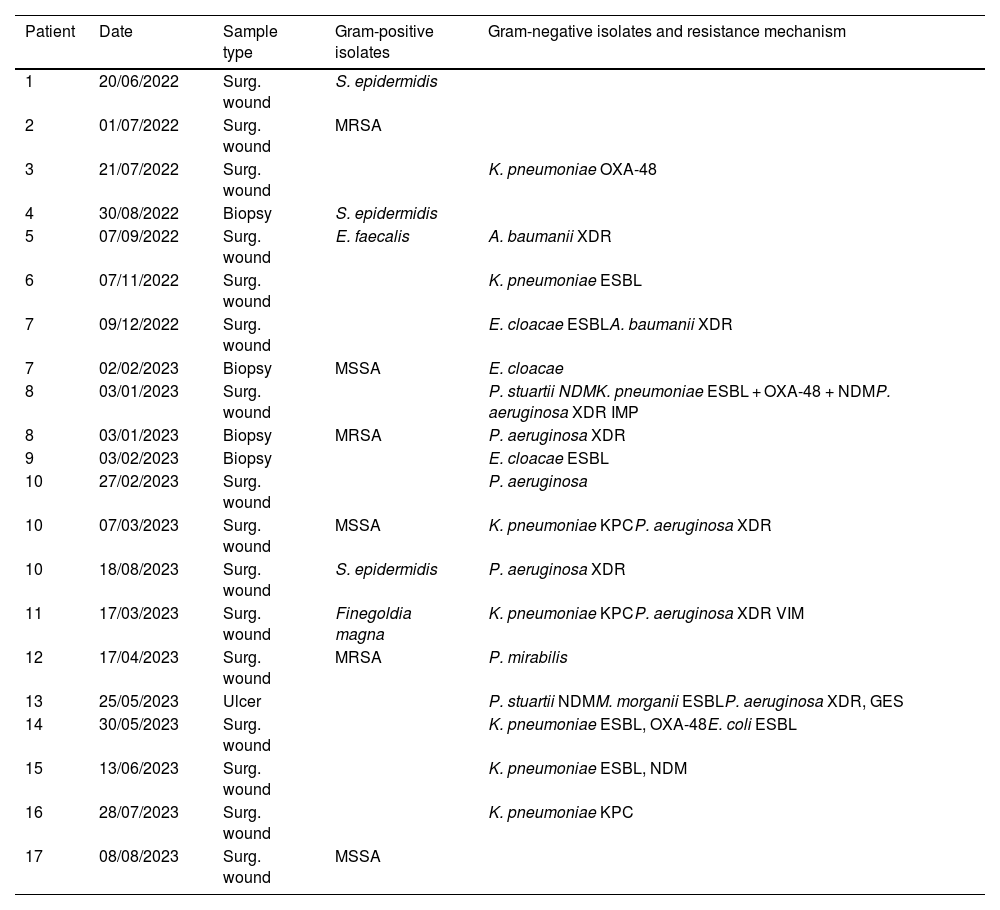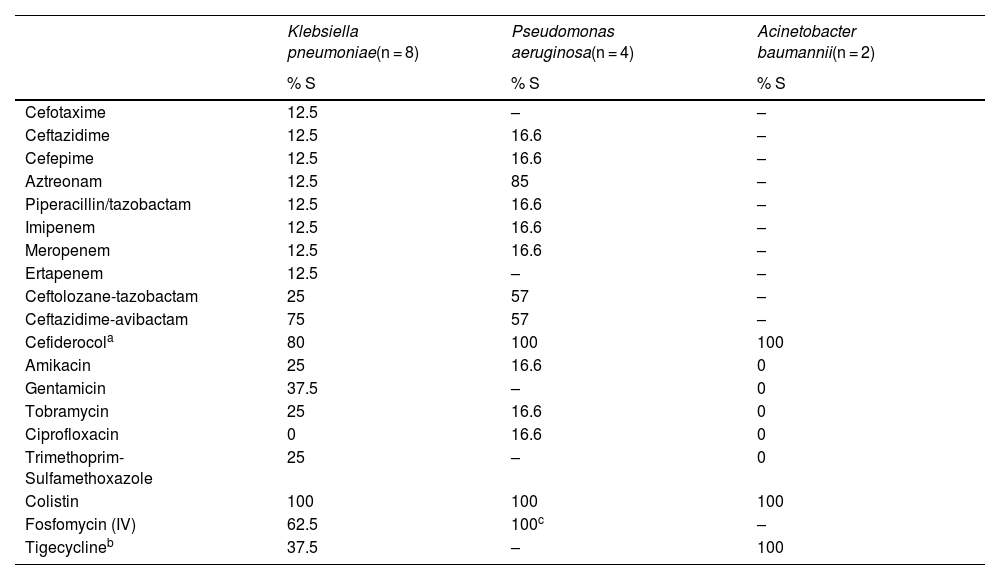The management of infections in war wounds is a problem aggravated by the presence of multiresistant bacteria and requires a combined approach with surgery. Literature has identified the risks and patterns of antibiotic resistance in previous armed conflicts, but the Russian-Ukrainian conflict has required the study of specific bacterial resistance patterns.
MethodsWe included war-injured patients from the Russian-Ukrainian conflict transferred for treatment to the General Defense Hospital of Zaragoza from May 2022 to October 2023. Epidemiological data, factors related to the injury, presence of infection and microbiological results were collected; These data were subsequently analyzed statistically.
ResultsFifty-three patients were included in the study, with a mean age of 35.6 years; 83% were injured by an explosive mechanism and all received antibiotic therapy prior to transfer. Seventeen patients had skin, soft tissue or joint infection. Correlation was demonstrated with the presence of bone lesion (p 0.03), skin coverage defect (p 0.000) and presence of foreign bodies (p 0.006). Nine patients had monomicrobial cultures, and the most frequently isolated microorganisms were Gram negative bacilli (GNB) and Staphylococcus aureus. Virtually all GNB presented some resistance mechanism.
ConclusionOur work shows the correlation of war wound infection with the presence of foreign bodies and affected tissues. Likewise, the presence of polymicrobial wounds is emphasized, with a predominance of GNB and multidrug-resistant S. aureus.
El manejo de infecciones en heridas de guerra es un problema agravado por la presencia de bacterias multirresistentes y requiere de abordaje combinado con cirugía. La literatura ha identificado los riesgos y patrones de resistencia antibiótica en conflictos armados previos, pero el conflicto ruso-ucraniano ha precisado el estudio de patrones de resistencia bacteriana específicos.
MétodosSe incluyeron los pacientes heridos de guerra del conflicto ruso-ucraniano trasladados para tratamiento al Hospital General de la Defensa de Zaragoza desde mayo de 2022 hasta octubre de 2023. Se recogieron datos epidemiológicos, factores relacionados con la lesión, presencia de infección y resultados microbiológicos; dichos datos posteriormente fueron analizados estadísticamente.
ResultadosSe incluyeron 53 pacientes en el estudio, con una edad media de 35,6 años; el 83% fue herido por mecanismo explosivo y todos recibieron antibioterapia previa a su traslado. De ellos, 17 presentaron infección de piel y partes blandas o articular. Se demostró asociación con la presencia de lesión ósea (p 0,03), defecto de cobertura cutánea (p 0,000) y presencia de cuerpos extraños (p 0,006). 9 pacientes presentaron cultivos monomicrobianos, y los microorganismos más frecuentemente aislados fueron bacilos Gram negativos (BGN) y Staphylococcus aureus. Prácticamente todos los BGN presentaron algún mecanismo de resistencia.
ConclusiónNuestro trabajo muestra la correlación de la infección de herida bélica con la presencia de cuerpos extraños y los tejidos afectos. Asimismo, se enfatiza la presencia heridas polimicrobianas, con predominio de BGN y S. aureus multirresistentes.
Article
Socio de la Sociedad Española de Enfermedades Infecciosas y Microbiología Clínica

Para acceder a la revista
Es necesario que lo haga desde la zona privada de la web de la SEIMC, clique aquí
Para realizar los cursos formativos
La actividad estará abierta para socios de la SEIMC. IMPORTANTE, recuerde que requiere registro previo gratuito. Empezar aquí










